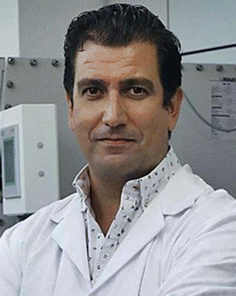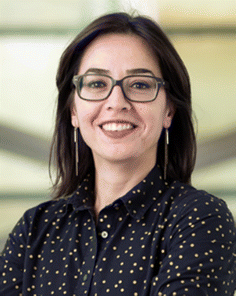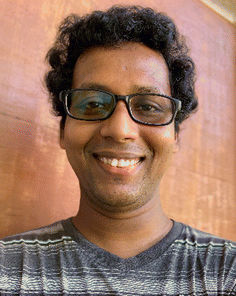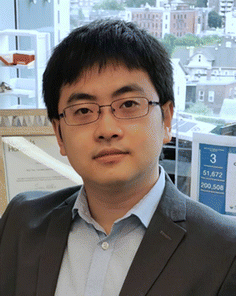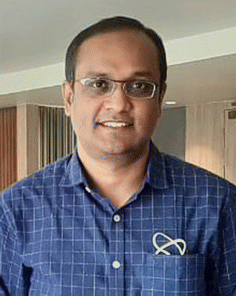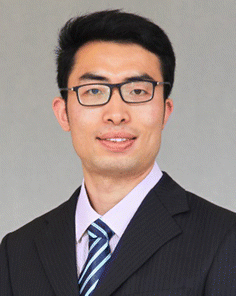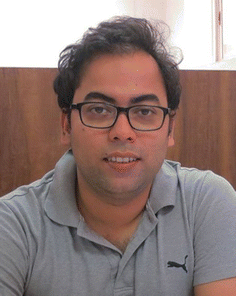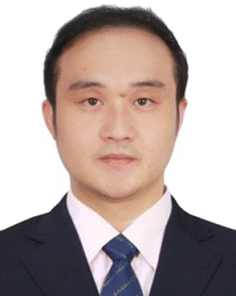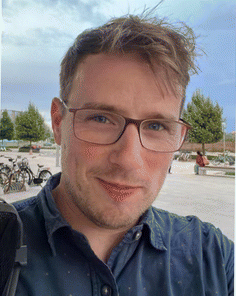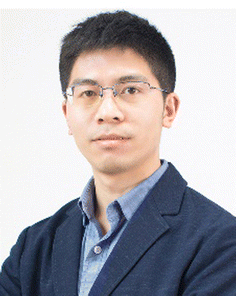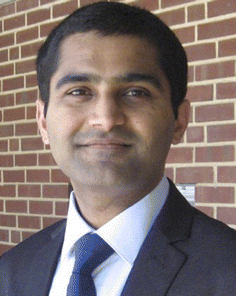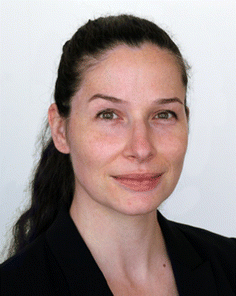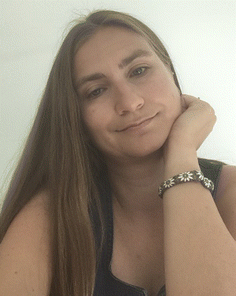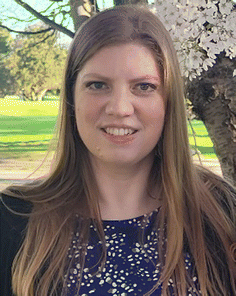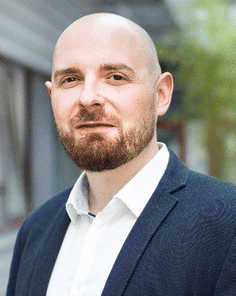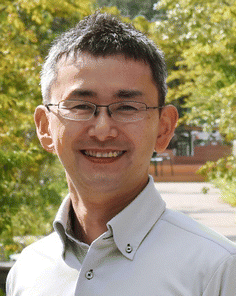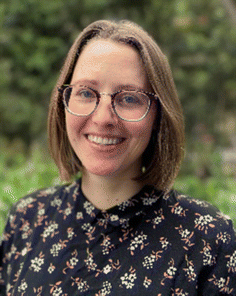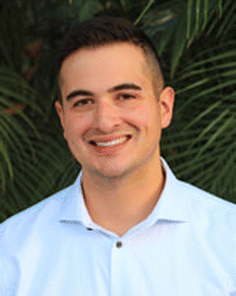DOI:
10.1039/D3CS90030D
(Profile)
Chem. Soc. Rev., 2023,
52, 2287-2293
Contributors to the 2022 Emerging Investigators collection
Gonzalo Abellán started his independent career at the Friedrich-Alexander-Universität, Erlangen-Nürnberg (FAU) as Junior Group Leader in 2017. After obtaining an ERC Starting Grant, and several national and international projects, he joined the University of Valencia (UV) as a GenT Excellence Distinguished Researcher establishing his research group 2D-Chem. He received, among others, the Best Thesis in Chemistry Award (UV), a Marie-Curie Fellowship, the Emerging Talents Initiative (FAU), the Ramón y Cajal Fellowship and the Spanish Royal Society of Chemistry Award to Young Researchers. His scientific interests are focused on the chemistry of two-dimensional (2D) materials, working on graphene, layered hydroxides and 2D-pnictogens, with special emphasis on the synthesis of hybrid materials and heterostructures. His group is committed to technology transfer, with significant efforts in energy storage (batteries & supercapacitors) and conversion (electrocatalysis). He is founder of the spin-off from the University of Valencia 2D-Match S.L. focused on the development of efficient and sustainable catalysts for green hydrogen production.
He grew up in Orihuela (Valencian Community, Spain), and his love for chemistry started at a young age while doing experiments with his father, who was a chemistry teacher. He has been fortunate to have excellent mentors throughout his career who have instilled in him a love of chemistry. Beyond science, he is a father of twins, husband of a wonderful scientist (also a chemist…), loves music and used to play electric guitar in several bands. He is also passionate about reading, food and the Real Madrid football team. Photo credit: Miguel Angel Montesinos.
Sahika Inal is an Associate Professor of Bioengineering with co-affiliations in Electrical Engineering and Materials Science and Engineering programs at King Abdullah University of Science and Technology (KAUST). She has a BSc degree in Textile Engineering from Istanbul Technical University (Turkey, 2007), an MSc in Polymer Science, and a PhD in Experimental Physics, both from the University of Potsdam, supervised by Prof. Dieter Neher (Germany, 2013). She completed her postdoctoral training with Prof. George Malliaras at the Center of Microelectronics of Provence of the Ecole Nationale Supérieure des Mines de Saint-Étienne (France, 2016). Her expertise is in polymer science and bioelectronic devices, particularly in the photophysics of conjugated polymers, electrical characterization of polymer films, and the design of biosensors and actuators. Since 2016, the Inal lab at KAUST exploits the functionalities of organic electronic materials, investigates ionic/electronic charge transport, and designs electronic devices that record/stimulate biological signals. Sahika is a Fellow of the Royal Society of Chemistry and has received recognitions, including the ACS PMSE Young Investigator Award 2022, Beilby Medal and Prize 2022,
Journal of Materials Chemistry Lectureship (2022), and has been shortlisted for the Nature Research Awards for Inspiring Women in Science in 2021. She is the author of 105+ publications, and her work has been cited more than 8900 times.
Uttam Manna, Fellow of the Royal Society of Chemistry (FRSC), is currently an associate professor at the Department of Chemistry in the Indian Institute of Technology, Guwahati (IITG). He is also an associated faculty member at the Centre for Nanotechnology and Jyoti and Bhupat Mehta School of Health Science and Technology, Indian Institute of Technology, Guwahati (IITG). He completed his BSc from Ramakrishna Mission Residential College, Narendrapur before pursuing a PhD at the Indian Institute of Science (IISc), Bangalore. He moved to the University of Wisconsin-Madison for his post-doctoral research from 2011 to 2015.
Journal of Materials Chemistry A (2018),
ChemComm (2020) and
Nanoscale (2021) recognized him as an emerging investigator. He is a recipient of the Humboldt Research Fellowship for Experienced Researchers from 2021 to 2023. He has been awarded the CRSI Bronze Medal for the year 2023. He is very passionate about learning new research topics and does not hesitate to take up challenges.
His research team is working on developing durable and functional bio-inspired wettability through strategic use of simple and scalable chemistry to address challenges related to energy, environment, chemical sensing and biomedical applications. He loves to spend time with his family. He enjoys listening to music and driving long distances.
Wei Tao is the Farokhzad Family Distinguished Chair for Innovation (Endowed Chair) and Principal Investigator in the Center for Nanomedicine, Department of Anesthesiology, Perioperative, and Pain Medicine at Brigham and Women's Hospital (BWH), Harvard Medical School (HMS). He is the first Chaired Professor as an assistant professor in his institution, as well as Clarivate's Global Highly Cited Researcher (continuously selected since 2021).
The research in his lab mainly focuses on biomaterials, nanotechnology and drug delivery, as well as their various applications in translational medicine. In detail, his research interests include the delivery of nucleic acids (mRNA, siRNA, etc.) for next-generation medicine, “living materials” (engineered cells, microbes, microalgae, etc.) for medical applications, and synthetic materials (nanoparticles, nanosheets, hydrogels, etc.) for therapy and detection. The new findings are largely driven by curiosity and exploration in his lab, and scientific achievements are important for his group. Equally importantly, his current and past lab members’ successes are essential for him, as well as his best rewards as a supervisor.
Biplab Maji, born in Howrah, India, obtained his MSc from IIT Kanpur in 2009 and PhD from Ludwig-Maximilians-Universität Munich in 2012 (supervisor: Prof. Dr Herbert Mayr). He did postdoctoral studies with Prof. Dr Hisashi Yamamoto at Chubu University, Japan, and Prof. Dr Frank Glorious at West-fälische Wilhelms-Universität Münster, Germany (as an Alexander von Humboldt fellow). In 2016, he joined the Department of Chemical Science, Indian Institute of Science Education and Research Kolkata as an assistant professor. In 2021, he was promoted to associate professor in the same department. His independent research focuses on organic synthesis and catalysis. Challenges in sustainable synthesis and reaction mechanisms keep him motivated. He is also very passionate about teaching.
Biplab enjoys cooking and wandering. And most of all, he loves spending time with his family. At home, his daughters, Tori and Titir, keep him busy.
Dr
Rengui Li received his PhD degree from Dalian Institute of Chemical Physics (DICP), Chinese Academy of Sciences in 2014 under the supervision of Prof. Can Li. He worked as a visiting research associate in Prof. Kazunari Domen's group at the University of Tokyo (2011) and Prof. Harry Atwater's group at California Institute of Technology (2019–2020). He was promoted to a full professor at DICP at 2018. His research interest is focused on artificial photosynthetic solar energy conversion, including photocatalytic and photoelectrochemical water splitting and carbon dioxide reduction into valuable chemicals. He has published more than 80 scientific papers in
Nat. Catal.,
Joule,
Nat. Commun.,
Angew. Chem., Int. Ed.,
Adv. Mater. etc. with more than 6500 citations. Dr Rengui Li has won various awards including the Young Scientist Prize at International Congress on Catalysis and Rising Star in Catalysis of China. At present, he serves as an editorial board member of journals like
Chinese Journal of Catalysis,
Chinese Chemical Letters and
Journal of Applied Chemistry.
Dibyendu Das is an Associate Professor at the Department of Chemical Sciences of IISER Kolkata, West Bengal, India. He obtained his PhD at Indian Association for the Cultivation of Science (IACS), India and postdoctoral training from Emory University, USA. His research group is interested in the emerging field of systems chemistry, chemical evolution and peptide nanotechnology. He has been awarded with Indian Peptide Society-Young Scientist, Swarnajayanti Fellowship, CRSI Medal. He was featured in the compendium (coffee table book) “75 scientists under the age of 50 shaping today's India” released by the Honorable Minister of State for the Ministry of Science &Technology, Govt. of India.
He grew up in Kolkata, the city of joy located in the eastern part of India. He has always been fascinated how living systems work from the perspective of a chemist. The intelligence and autonomy of living matter keep inspiring him to attempt synthesizing materials with adaptive properties. Also, the questions of the chemical origin of life and chemical evolution excite his lab. Regarding hobbies, he loves cooking Bengali cuisine and swimming. Cross country drives for travelling also excite him a lot. And to top it all, he has a 4-year-old daughter who keeps him busy when back home!
Dong Wang received his PhD degree from Bordeaux University, and he conducted his postdoctoral study at the University of Toronto and HKUST. He is currently a distinguished professor in Shenzhen University. His research focuses on the design, preparation and biomedical applications of novel fluorescent materials. He has developed a series of novel chromophores, particularly for NIR-II emissive fluorescent photosensitizers, and their structure–function relationships for subcellular organelle-targeting, photosensitizing and bacterial discrimination were illustrated. In addition, the biomaterials assembled by those photosensitizers have been successfully utilized for highly efficient and multi-modality tumor phototheranostics, as well as the specific discrimination and efficacious photodynamic killing of bacteria. On the basis of those studies, he coined and elaborated the concept of aggregation-enhanced theranostics (AET). He has published more than 170 papers, which have been cited more than 8000 times. As the first or the corresponding author, he has published 140 papers in many high-level journals such as
Chem. Soc. Rev.,
Adv. Mater.,
Angew. Chem., Int. Ed., and
J. Am. Chem. Soc. In addition, 16 papers were selected as “ESI highly cited papers”.
Graham Newton is an Associate Professor in Inorganic and Materials Chemistry at the University of Nottingham. His research group works at the interface between inorganic and organic synthesis, electrochemistry, and energy device fabrication. He completed his PhD at the University of Glasgow in 2009 before moving on a JSPS postdoctoral fellowship to the University of Tsukuba, where he stayed on as an Assistant Professor before moving to Nottingham in 2015.
He loves the creativity that goes with research in chemistry – the problem solving that's needed when things get complicated, finding the right words and images to explain what you’re talking about, and the flashes of beauty that you find in crystallisations, microscopy and spectroscopy. Outside of the lab you will probably find him running, cleaning up after children, or trying to get people to go out for karaoke.
Congqing Zhu started his independent career in 2016 at Nanjing University, China as a Professor of State Key Laboratory of Coordination Chemistry, School of Chemistry and Chemical Engineering. He was honored with Jiangsu Specially-Appointed Professor in 2017, Young Elite Scientists Sponsorship Program by CAST in 2017, Shuangchuang Talent Program of Jiangsu Province in 2018, the Top-Notch Young Talents Program of China in 2020. He won the second prize of the National Natural Science Award (ranked 4), the Huang Yao-Zeng Organometallic Chemistry Younger Award and the Jingqing Award for Rising Star of the Chinese Chemical Society in 2021.
He was born in Anhui, China. He received his PhD from Xiamen University in 2014 under the supervision of Prof. Haiping Xia. At that time, he discovered his passion for working in organometallic chemistry. For this reason, after finishing his iChEM fellow research in China, he continued his research as a postdoctoral associate in Prof. Richard Schrock's group at MIT. He began his independent research in 2016. His interests are focused on organometallic chemistry, coordination chemistry, and small molecule activation. One phrase he always says to his students is “Any success or failure only represents the past, not the present or the future”.
Abhishek Sharma is an Assistant Professor in the Department of Chemistry and Chemical Biology, Stevens Institute of Technology. He obtained his PhD degree at CSIR-IHBT, India. He pursued postdoctoral research at the University of Leuven, Belgium, and the University of Illinois at Urbana-Champaign.
His research group is interested in the development of new synthetic methods that significantly expand the chemical space of bioactive molecules and in the discovery of drugs with novel mechanisms of action for breast cancer treatment. Outside of academics, he enjoys running, bicycling and listening to music.
Dr
Eszter Boros is an Associate Professor of Chemistry at Stony Brook University. The Boros research group develops new coordination chemistry approaches to metal-based diagnostics and therapeutics at the interfaces of Radiochemistry, Inorganic Chemistry and Medicine and validates novel chemistry in preclinical animal models of disease.
She was born and raised in Zurich, Switzerland, as the daughter of Hungarian expats who decided to not return to their native country after the fall of the Iron Curtain. Throughout high school, she was always interested in science and enrolled at the University of Zurich as a biochemistry major. She decided to switch to chemistry (and specifically inorganic chemistry) after one of Prof. Roger Alberto's general chemistry lectures where he talked about the chemotherapeutic drug cisplatin and its mechanism of action. She was captivated by the fact that this simple compound, which did not contain any carbons, had such peculiar chemical reactivity, resulting in macroscopically observable effects in clinical medicine. Today, she is fortunate to lead a research group of curious and enthusiastic undergrads, graduate students, and postdoctoral fellows and be part of her lab's exciting discoveries. In her free time, she spends time with her family and likes to ice/roller skate.
Anna M. Kaczmarek obtained a permanent position at the Department of Chemistry at Ghent University in Belgium in 2020 and created the NanoSensing Group. The group focuses on the development of luminescent (nano)thermometers, with special interest towards biomedical applications and theranostics.
She grew up both in Poland and the USA and became interested in chemistry at an early age. Over the years her role model has always been the Polish-French physicist and chemist Marie Sklodowska-Curie.
Anna studied Chemistry at the Adam Mickiewicz University in Poznan, Poland. Afterwards, she moved to Belgium and acquired a PhD at Ghent University in 2015 in the field of luminescent lanthanide-doped inorganic nano- and micro-sized materials. After that she worked as a post-doctoral researcher in several groups at Ghent University, as well as carrying out several research stays at Cordoba University (Spain) and Utrecht University (the Netherlands). In 2020 she obtained a permanent position at the Department of Chemistry at Ghent University. In the same year she obtained the prestigious ERC Starting Grant on the topic of nanothermometers for theranostics, which has allowed her to build an excellent team of young researchers. The group is currently striving to develop new multifunctional nanothermometer materials for theranostics, with great focus on biocompatibility and biodegradability.
Anna McConnell started her independent career in November 2016 as a Junior Professor in the Otto Diels Institute of Organic Chemistry at Kiel University. Her group is interested in the design of stimuli-responsive metal–organic cages, the synthesis and dynamic covalent chemistry of amidoboronates and luminescent complexes.
She grew up in New Zealand interested in science and music before studying Chemistry at the University of Canterbury. She then moved to the UK for a DPhil at the University of Oxford with Prof. Paul Beer where she got interested in supramolecular chemistry. Afterwards, she moved to the California Institute of Technology for a postdoc with Prof. Jackie Barton followed by a second postdoc with Prof. Jonathan Nitschke at the University of Cambridge. She is very grateful for the support from her mentors during her career and being able to work with such talented young chemists. In her spare time she enjoys spending time with family and friends, getting back to New Zealand as often as she can, listening to music and knitting.
Robert Göstl studied chemistry at Humboldt-Universität zu Berlin. There, he obtained his diploma degree in 2011 and his doctoral degree in 2014. Afterwards, he pursued his postdoctoral research at Eindhoven University of Technology until 2016. At DWI – Leibniz Institute for Interactive Materials he is leading an independent research group. He was distinguished for his early independent career achievements by the German Chemical Society, the Royal Society of Chemistry, and the American Chemical Society. The Capital magazine selected him as Top 40 under 40.
Richard Feynman once famously said “What I cannot create, I do not understand”. Since Robert was a child, and he observes this with his own children as well, his curiosity has been driven by an inverse interpretation of this quote turning it into “What I cannot deconstruct, I do not understand”. He believes that there is an inherent constructive power in the purposeful destruction of things and this resonates perfectly with his research. He is breaking polymers to find out why they have the properties they do. Then he uses this knowledge to improve them.
Yoichi Kobayashi started his independent career as an associate professor at Ritsumeikan University after his postdoc research at the University of Toronto and research as an assistant Professor at Aoyama Gakuin University. He received his PhD in Chemistry at Kwansei Gakuin University in 2011. He has been awarded the
Nanoscale Horizons Award and has been recognized as a 2022
ChemComm Pioneering Investigator and 2021
Nanoscale Emerging Investigator.
He was born and grew up in Aichi, Japan. His interest is in exploring novel photofunctions of organic molecules and inorganic nanomaterials using time-resolved spectroscopic techniques, and applying this knowledge to develop novel photofunctional materials. Some examples of his research include nonlinear photofunctional materials that work with LEDs and sunlight, photochemical reactions utilizing higher excited states, and photochromic reactions utilizing inorganic nanomaterials. Out of the academic life, he enjoys listening to music, tasting beers and wines, and spending time with his family.
Dr
Annie Colebatch is currently a Senior Lecturer and ARC DECRA Fellow at the Australian National University. Having grown up in Canberra, she studied her BSc and PhD there at the Australian National University. After 4 years as a postdoc in the UK she returned to the ANU in 2019 to start her independent research career.
She has always enjoyed being part of a team. Now she gets to study teamwork, or “cooperativity”, on a molecular scale! Her research team looks at how different chemical moieties within a molecule can work cooperatively to achieve a certain outcome. In particular, the team are studying metal–metal and metal–ligand cooperativity in bimetallic complexes. They are interested in both the fundamental understanding and applications of cooperativity. A major focus is how to design systems capable of this, and they end up spending a lot of time on ligand design. The team is also interested in how they can utilise cooperative effects, such as in hydrogenation/dehydrogenation catalysis and electrochemical applications. She loves the fantastic team of co-workers, colleagues and mentors who have helped her throughout her career. Outside of work her hobbies include good friends and good food, travel, soccer, swing dancing and sewing.
Marcus W. Drover is an Assistant Professor at the University of Windsor in Windsor, ON, Canada. In July 2023, his team will relocate to Western University in London, ON, Canada. He received a BSc (Hons) from Memorial University of Newfoundland (2012), a PhD in chemistry from the University of British Columbia with Laurel L. Schafer and Jennifer A. Love (2016) and performed postdoctoral work at the California Institute of Technology with Jonas C. Peters (2017–2019). Drover was recipient of a Vanier scholarship (2013–2016), Michael Smith Foreign Study Supplement (held at Oxford with Andrew S. Weller), Banting and Resnick Postdoctoral Fellowships (2017–2019), and was most recently awarded the Polanyi Prize in Chemistry (2020), for his work as an early-career researcher in the province of Ontario. He is a member of the Editorial Advisory Board of
Organometallics (2023–2026) and the
Journal of Coordination Chemistry (2023–2026). His team is motivated by a desire to revise the way in which we, as humans, interact with the planet by inventing ways to utilize greenhouse gasses as feedstocks, designing new catalysts for clean energy, and providing better methods for the synthesis of specialty chemicals, pharmaceuticals, and bulk consumer products. In his spare time, Marcus enjoys travelling/exploring new things and spending time with his family, including his two French Bulldogs, Merlot and Cookie.
|
| This journal is © The Royal Society of Chemistry 2023 |
Click here to see how this site uses Cookies. View our privacy policy here. 
